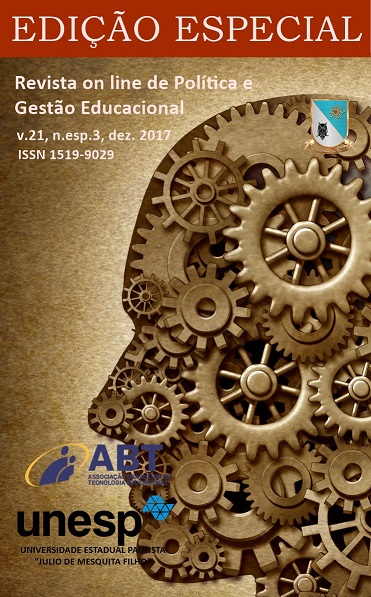Internet, memory and learning: digital technology and the implications in memory
DOI:
https://doi.org/10.22633/rpge.v21.n.esp3.2017.10073Keywords:
Technology. Internet. Memory. Learning.Abstract
Human development is largely linked to the technologies and the accumulated knowledge of the time. The human being makes instruments, manufactures appliances, coexists with a certain technique that makes a peculiar circumstance. Technology and society are inextricably linked to the Internet, also called web 2.0, and it is the most evident expression of our socio-cultural and technological moment. This communication technology, which was revolutionary, is now strongly rooted in daily activities, invading life in many ways. The objective of this research was to show, through a case study with in-depth interviews with network users, the changes caused by it - new relations with time and space, forms of sociability, access to large amounts of information and interactivity - they changed radically habits and behaviors, ways to communicate, interact and learning and created an extreme dependency relationship with this medium. As a result, the internet is increasingly in memory of its members in their memories and individual experiences and it also has a great influence on the formation of social memory. By changing the everyday life and its communication processes, it also changes ways of thinking, worldviews and plays an important role in the creation, maintenance and development of the symbolic life, which contributes to the formation of collective memory. Internet lives in a kind of feedback loop with the collective memory: influences the memories of its members and at the same time, feeds repeatedly imaginary and social memory.Downloads
References
BENEYTO, José Vidal (org.). La ventana Global: ciberespacio, esfera pública mundial y universo mediático. Madrid: Taurus, 2002.
BOSI, Ecléa. Memória e sociedade: lembranças de velhos. 7ed. São Paulo: Cia das Letras, 1999.
CASTELLS, Manuel. A era da informação: economia, sociedade e cultura. v.1 A Sociedade em rede. São Paulo: Paz e Terra, 1999.
CASTELLS, Manuel. A era da informação: economia, sociedade e cultura. v. 2. A Sociedade em rede. São Paulo: Paz e Terra, 1999.
CANAVILHAS, João Messias. A Internet como memória. Disponível em: http://bocc.ubi.pt. Acesso em: 01 dez. 2016.
COLAVITTI, Fernanda. A memória e o caos digital. Disponível em: http://galileu.globo.com/edic/130/memo.htm. Acesso em: 17 jul. 2017.
DEFLEUR, Melvin L.; BALL-ROKEACH, Sandra. Teorias da comunicação de massa. Rio de janeiro: Jorge Zahar, 1993.
HALBWACHS, Maurice. A memória coletiva. São Paulo: Vértice/Revista dos tribunais, 1990.
IZQUIERDO, Ivan. A voz da memória. Pesquisa Fapesp, no 99, maio, 2004.
IZQUIERDO, Ivan. Memória. Porto Alegre: Artmed, 2002.
KOYRÉ, Alexandre. Do mundo fechado ao universo infinito. São Paulo: Forense, s/d.
LEMOS, André. Cibercultura: tecnologia e vida social na cultura contemporânea. Porto Alegre: Sulina, 2004.
LEVY, Pierre. Cibercultura. São Paulo: editora 34, 1999.
LEVY, Pierre. Tecnologias da inteligência: o futuro do pensamento na era da informática. São Paulo: editora 34, 2002.
LOPES, Luiz Carlos. O culto às mídias: Interpretação, cultura e contratos. São Paulo: Edufscar, 2004.
ORTEGA Y GASSET, José. Em torno a Galileu: esquema das crises. Petrópolis: Vozes, 1989.
SHACTER, Daniel L. Os sete pecados da memória: como a mente esquece e lembra. Rio de Janeiro: Rocco, 2003.
TRUJILLO, Victor. Pesquisa de mercado: qualitativa e quantitativa. São Paulo: Scortecci, 2001.











